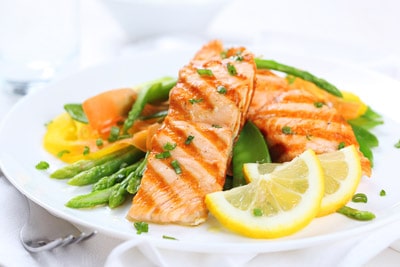2019 -2023 Update. Since making that vid below based on a protein overfeeding study, more data has accumulated showing protein is the least likely macro nutrient to convert to bodyfat during overfeeding. In fact, it’s exceedingly difficult to gain bodyfat over eating protein. I have being saying that for three plus decades and the claims all calories are created equal debunked a while ago, yet, some still cling to it. There’s a bunch of long held outdated nutritional information finally being debunked, and this is yet another. Here’s a recent review paper that examines the effects of the different macro nutrients and their respective impacts on bodyfat. They conclude:
In this vid I cover the (seemingly) never ending debate regarding the old advice that “protein intakes above your requirements will just be converted to bodyfat” that is the mantra of traditional nutrition advice. Is it true?
More Protein Myths Covered HERE
This is the study discussed in this video:
The effects of consuming a high protein diet (4.4 g/kg/d) on body composition in resistance-trained individuals
Jose Antonio*, Corey A Peacock, Anya Ellerbroek, Brandon Fromhoff and Tobin Silver
Journal of the International Society of Sports Nutrition 2014, 11:19 doi:10.1186/1550-2783-11-19
Background
The consumption of dietary protein is important for resistance-trained individuals. It has been posited that intakes of 1.4 to 2.0 g/kg/day are needed for physically active individuals. Thus, the purpose of this investigation was to determine the effects of a very high protein diet (4.4 g/kg/d) on body composition in resistance-trained men and women.
Methods
Thirty healthy resistance-trained individuals participated in this study (mean ± SD; age: 24.1 ± 5.6 yr; height: 171.4 ± 8.8 cm; weight: 73.3 ± 11.5 kg). Subjects were randomly assigned to one of the following groups: Control (CON) or high protein (HP). The CON group was instructed to maintain the same training and dietary habits over the course of the 8 week study. The HP group was instructed to consume 4.4 grams of protein per kg body weight daily. They were also instructed to maintain the same training and dietary habits (e.g. maintain the same fat and carbohydrate intake). Body composition (Bod Pod®), training volume (i.e. volume load), and food intake were determined at baseline and over the 8 week treatment period.
Results
The HP group consumed significantly more protein and calories pre vs post (p < 0.05). Furthermore, the HP group consumed significantly more protein and calories than the CON (p < 0.05). The HP group consumed on average 307 ± 69 grams of protein compared to 138 ± 42 in the CON. When expressed per unit body weight, the HP group consumed 4.4 ± 0.8 g/kg/d of protein versus 1.8 ± 0.4 g/kg/d in the CON. There were no changes in training volume for either group. Moreover, there were no significant changes over time or between groups for body weight, fat mass, fat free mass, or percent body fat.
Conclusions
Consuming 5.5 times the recommended daily allowance of protein has no effect on body composition in resistance-trained individuals who otherwise maintain the same training regimen. This is the first interventional study to demonstrate that consuming a hypercaloric high protein diet does not result in an increase in body fat.
Full study:
http://www.jissn.com/content/11/1/19#abs
Will Brink is the owner of the Brinkzone Blog. Will has over 30 years experience as a respected author, columnist and consultant, to the supplement, fitness, bodybuilding, and weight loss industry and has been extensively published. Will graduated from Harvard University with a concentration in the natural sciences, and is a consultant to major supplement, dairy, and pharmaceutical companies.
His often ground breaking articles can be found in publications such as Lets Live, Muscle Media 2000, MuscleMag International, The Life Extension Magazine, Muscle n Fitness, Inside Karate, Exercise For Men Only, Body International, Power, Oxygen, Penthouse, Women’s World and The Townsend Letter For Doctors.
He’s also been published in peer reviewed journals.
Will is the author of the popular e-books, both accompanied by private members forum access , Bodybuilding Revealed & Fat Loss Revealed.
You can also buy Will’s other books on Amazon, Apple iBook, and Barnes and Noble.





I agree, I don’t know why more people don’t understand this. Of course a calorie is not a calorie. Do people not understand that protein is a blood sugar regulator, in it helps control the insulin spike generated, especially from hi-GI carbs?
Great Video Will. Very satisfying to hear a facts and figures guy like you , corroborate what myself and hosts of other trainees through the ages have no doubt experienced anecdotally. I always weigh and measure carbs and to a lesser extent fats ( just sticking to healthy ones) But I never do with protein. Iin fact as a died in the wool carnivore , I probably tend to over do the protein a bit and never have an issue maintaining a low % of body fat as long as training stays consistent.. Thanks again for the great info and for sifting through all these studies for us lay-folks…you rock!
Thanx Dan!
Hi Will: Thank you for you excellent information, please keep your valuable contribution coming. I was always concerned about taking excess protein after my workout and this puts it to rest. Also i like the honesty in your video, when it comes to fact and data, and if people do agree, they should smack their head.
*I meant do not agree
Will, what do you think about the more or less recent study linking higher protein intake with increased cancer risk ? While I can’t quite recall the details, I recall that people older than 55 (or was it 65 ?) had a decreased risk of cancer – it was younger people who had an increased risk of cancer in association with a higher protein intake.
Thanks
If you search the site for my vid “Do “High” Protein Diets Cause Cancer ? ” it should cover your Q and was based on the study you’re referring to I believe.
I’ve inadvertently opted out of email notification, so I’m merely leaving this msg because one needs to leave a msg to opt in again. Sorry for the inconvenience.
Given that the study reported, “no increases in fat free body mass,” one might also infer that excessive protein, beyond the 1 gram/pound intake, may be an unnecessary endeavor and expense for a training athlete.
I’d say that’s generally true. Above and beyond your needs, additional protein does not seem to be of benefit, as least to strength athletes.
Silly question, really. What does the term p stand for in these studies? As in (p<0.05) ?
“P values” are related to statistical analysis the effect is unlikely due to chance or other variables. It’s short hand science lingo.
Got it. P<0.05 means there is a 5% chance of it "happening by accident".
That’s interesting.
OK, whoa now, wait a sec.
These were resistance trained people eating about 2200 calories a day, with a body weight on the average of 160 pounds. Training 8.5 hours a week, and around 16% average body fat – male mixed with female, so pretty low on average.
So – running this through metabolic equations, Katch-McArdle since it’s gender neutral, and giving these folks an activity factor somewhere between moderate to very active, looks like about 2400-2800 calories, probably closer to the top end.
Reasonable to assume their daily calorie needs were on paper at least, more than what they were eating. Let’s play the devil’s advocate here, and say that they were adapted to a lower intake at the start of the study.
If so, then eating 2800 calories puts them at best at a mild surplus – and the roughly 25% thermic effect of that protein means that of those extra 580 calories of protein amounted to only 435 useful calories.
435 plus the 2200 they started at = 2635 calories. Theoretical maintenance is at or above that.
Then, they upped their training volume a bit.
Does this study prove anything except that trained athletes at low fat levels and adapted to lower calorie levels could eat at a maintenance level and up training volume a bit, and not gain weight?
Now, repeat that with another 580 calories of protein-only above their actual maintenance, and what would happen?
The answer to that Q is, I don’t know as we don’t have that study. It stands to reason, that at some point of calorie surplus people would add some BF, but I have yet to find it. Note I have linked a recent review that looks at the effects of overfeeding macros, which included the lit on overfeeding P, which is clearly far less likely to increase BF under over feeding conditions. It appears exceedingly difficult to increase BF% by overeating P, especially if some RT is involved.
I’m wondering what would happen if a trainee simply substitutes the extra protein for a portion of his or her carb and fat intake.
If this all works as the study seems to indicate, then it should be possible for an overweight or obese individual to make an isocaloric substitution and move macro ratios toward perhaps P:C:F of 45:30:25 from, say, a start at 25:45:30 and experience fat loss without reducing total calories.
This would be great if your goal was to drop fat without slowing your metabolism.
Another possibility would be to move the macros toward protein and in addition cut calories 10-20%.
It should really accelerate the speed of fat loss with minimal metabolic impact, one would think.
Can it be as simple as that?
Higher P diets are generally superior for fat loss but as always, a balance must exist nutritionally.